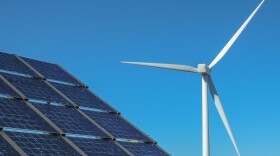Currently, there are only 14 states in the U.S. that run a retail electric utility market, meaning, they allow consumers to choose from whom they want to buy their power. But Nevada could become the 15th state if voters pass a ballot initiative known as Question Three. Supporters say the move would create competition that would drive prices down and bolster innovation. Opponents say the uncertainty of a deregulated market could wreak havoc on the state.
KUNR's Paul Boger spoke with Riley Snyder, a reporter who covers energy policy for the Nevada Independent, to break down the question and what it could mean for the Silver State.
"Question Three is trying to open parts of Nevada's constitution to open parts of that electric market to additional companies and to specifically prohibit a monopoly in the electric market," Snyder explained. "What that means for most people, outside of energy nerds like me who care about all three aspects of the market and where all the power comes from, is that instead of just having NV Energy... what would likely happen is that the state would set up a website...where you can search for electric plans. You can say, 'I want to get 100 percent renewable energy,' and search for plans that do that or you can find the cheapest rates."
That choice aspect was very popular the first time this initiative appeared on the ballot in 2016. In that election, nearly three out of four voters approved the measure. But over the past two years, opponents of the measure have raised questions with one of the biggest being: How would the proposed amendment affect communities outside Las Vegas and Reno?
"Their concern is that by introducing competition into the electric market, you're going to mess with the business model and structure for these electric cooperatives, who often times are put in place because a normal business isn't going to serve the Elys or the Elkos of the world because there aren't that many customers," Snyder said. "Their concern is brought by the fact that this is a constitutional amendment so the legislature can't pass a law saying this only affects Vegas and Reno and the rurals are kept out. Under the constitutional amendment, you, me and everyone else in the state will have the right to purchase electricity from a provider of our choice."
This article is an excerpt of an extended conversation. You can listen to a longer interview by clicking the play button above.








